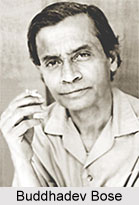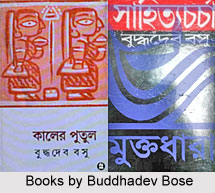 Buddhadev Bose is the mascot among those who are counted as post tagorean authors the avant garde group in the soil of Bengal. He had been largely involved with editorial work at one point of time during his robust career. He reflected a shift from the clandestine idealism that emitted from the factory store of the Boisakh sun-Tagore into urban and secular themes. His works breathe cosmopolitanism and drenched by the influence of Baudelaire which brought more stones hurled than extolment until later, posthumously.
Buddhadev Bose is the mascot among those who are counted as post tagorean authors the avant garde group in the soil of Bengal. He had been largely involved with editorial work at one point of time during his robust career. He reflected a shift from the clandestine idealism that emitted from the factory store of the Boisakh sun-Tagore into urban and secular themes. His works breathe cosmopolitanism and drenched by the influence of Baudelaire which brought more stones hurled than extolment until later, posthumously.
He edited and published Pragati (1927-29) from Dhaka and Kavita (1935-1960) from Kolkata. Kavita, which published poems, was highly regarded in literary circles and played an important role in the post-Rabindra movement Buddhadev Bose himself was able to emerge from under Tagore`s shadow.
He began as a romantic poet, but later emphasized thought more than emotion. He was also a writer of remarkable prose, writing both reflective articles and literary criticism. In 1967, Buddhadev Bose received the Sahitya Akademi Puraskar for his play Tapasvi O Tarangini. In 1970 the Government of India awarded him the Padmabhusan. He received the Rabindra Award posthumously for his book of verse Svagata Biday (1974). He died on 8 March 1974 in Calcutta.
Works of Buddhadev Bose
Boldness of conception, originality in outlook, novelty in characterisation, skilful handling of complex situations was rate literary qualities among older writers. Buddhadev changed these concepts. The standard of taste of the public was not always high and a poor standard often produced mediocre literature. The vastness of the subject-matter of literature has introduced exuberance of fancy, complexity of emotions, and heightened imaginativeness. Technique has become simplified. The highest thoughts are clothed in lucid language. There is no over-ornamentation. Variety has replaced uniformity. The personality of the writer for which there was so little place in older Bengali literature, finds today an adequate expression. The note of subjectivity which is a marked feature of the literature of the West has led to the replacement of the classic strains of older Indian literature by personal lyrics in modern Bengali.
 Politics was an inescapable reality during Bose`s generation. A member of several left-leaning groups in the 30`s and 40`s, he later felt that "what had been conceptually liberal turned into various hardened ideologies." Frustrated by poets that lapsed into what he felt was "political cacophony." He had a growing sense of disillusionment, then frustration, with some Bengali poetry of the late 1940`s and beyond. On one hand seen as hard-working and sincere, he also had the reputation for being uncompromising and stubbornly stuck in his ways.
Politics was an inescapable reality during Bose`s generation. A member of several left-leaning groups in the 30`s and 40`s, he later felt that "what had been conceptually liberal turned into various hardened ideologies." Frustrated by poets that lapsed into what he felt was "political cacophony." He had a growing sense of disillusionment, then frustration, with some Bengali poetry of the late 1940`s and beyond. On one hand seen as hard-working and sincere, he also had the reputation for being uncompromising and stubbornly stuck in his ways.
Bose was a fairly prolific writer, with over a hundred books to his credit. His books of poetry include Bandir Bandana (1930), Kankavati (1937), Draupadir Shadi (1948), Shiter Prarthana: Basanter Uttar (1955), Ye Andhar Alor Adhik (1958). He wrote a number of novels: Lal Megh (1934), Ratbhar Brsti (1967), Patal Theke Alap (1967), Golap Keno Kalo (1968). Among his short story anthologies are Abhinay, Abhinay Nay (1930), Rekha Chitra (1931), Bhaso Amar Bhela (1963). His plays include Tapasvi O Tarangini (1966) and Kolkatar Electra O Satyasandha (1968).
His essays are anthologized in Kaler Putul (1946), Sahityacharcha (1954), Rabindranath: Kathasahitya (1955), Svadesh O Sangskrti (1957). He also wrote a number of travelogues and memoirs: Hathat Alor Jhalkani (1935), Sab Peyechhir Deshe (1941), Japani Journal (1962), Deshantar (1966), Amar Chhelebela (1973), Amar Yauban (1976). His translations include Kalidaser Meghdut (1957), Charles Baudelaire: Tar Kavita (1960), Rainer Maria Rilker Kavita (1970) etc. He also wrote a number of children`s books as well as some poems and articles in English. He distrusted the "poetry of the moment" and longed for a verse that was "conceived in the soul". His poetics valued a perfection of craft and intentionality and included distrust for political content and formal experimentation for the times to come and roll on.



















